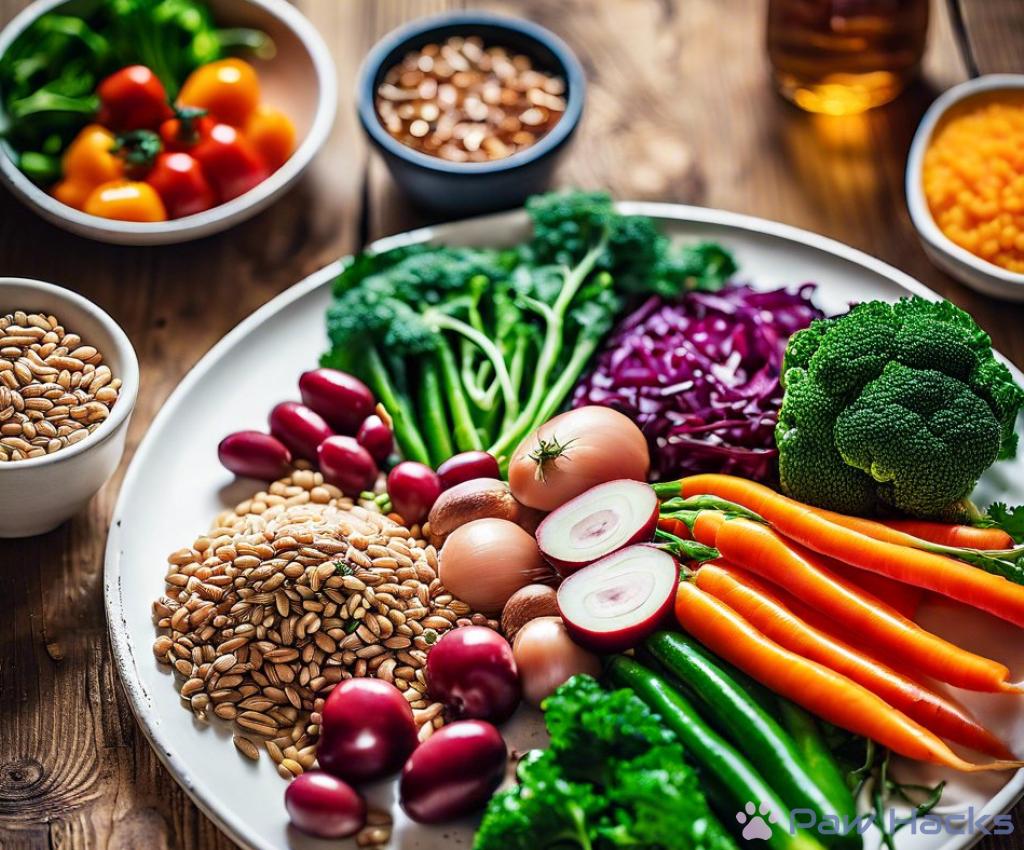Cat Kidney Disease Diet Tips
Choosing the Right Food: What to Look for in a Kidney-Friendly Diet

Maintaining your cat’s kidney health is crucial, especially for those diagnosed with kidney disease. A kidney-friendly diet can help manage symptoms and improve their quality of life. But what does that mean? It’s essential to know what to look for in their food to ensure it’s suitable for their condition.
When selecting food for a cat with kidney disease, several nutritional components should be prioritized. These factors can make a significant difference in your cat’s overall health and well-being.
- Low Protein Content: Cats with kidney disease often require diets lower in protein to reduce the workload on their kidneys, while still providing sufficient nutrients.
- High-Quality Protein Sources: When protein is included, it should come from high-quality sources that are easy to digest. This helps maintain muscle mass without stressing the kidneys.
- Reduced Phosphorus Levels: A kidney-friendly diet should have lower phosphorus levels to help slow the progression of kidney disease.
- Increased Omega-3 Fatty Acids: Foods rich in Omega-3 can help reduce inflammation and support kidney function.
- Hydration: Wet food can be beneficial as it contains more moisture, helping your cat stay hydrated.
Reading and understanding pet food labels is vital when choosing the right diet for your cat. Here’s a simple comparison table to help you identify the key aspects of a kidney-friendly cat food.
| Criteria | Kidney-Friendly Food | Regular Cat Food |
|---|---|---|
| Protein Level | Low | High |
| Phosphorus Content | Low | High |
| Moisture Content | High (Wet Food) | Low (Dry Food) |
| Quality of Proteins | High-Quality Sources | Variable |
By paying attention to these criteria on food labels, you can make informed decisions that cater to your cat’s specific dietary needs. Remember, every cat is unique, so consulting with a veterinarian is recommended for personalized advice.
Hydration Matters: How to Keep Your Cat Well-Hydrated
When it comes to managing kidney disease in cats, maintaining adequate hydration is essential. Water plays a vital role in the overall health of your feline friend, particularly when their kidneys are compromised. Proper hydration helps to flush out toxins from the body and supports the kidneys in their function. Cats with kidney disease may not drink enough water on their own, making it crucial for pet owners to encourage fluid intake.
There are various approaches you can take to ensure your cat stays hydrated. First, consider incorporating wet food into their diet. Unlike dry food, wet food contains significantly higher moisture content, which can effectively boost your cat’s fluid intake. Additionally, you can try providing a fresh supply of water in multiple locations around your home, as some cats prefer drinking in different spots. Another effective method is to experiment with water fountains. Many cats are attracted to moving water, which may encourage them to drink more frequently.
| Type of Water Source | Hydration Benefits |
|---|---|
| Fresh Water Bowls | Easy to refill; allows for personal preference |
| Wet Cat Food | Increases moisture intake significantly |
| Water Fountains | Encourages frequent drinking; keeps water fresh |
It’s important to monitor your cat’s hydration levels closely. Look out for signs of dehydration, which can include lethargy, dry gums, and decreased skin elasticity. If you notice any of these symptoms, it’s advisable to consult your veterinarian immediately. Additionally, you can perform a simple test at home by gently pinching the skin at the back of their neck; if it doesn’t return to its normal position quickly, your cat may be dehydrated. Keeping a close eye on their hydration can lead to early detection of issues and help manage their kidney health more effectively.
Portion Control: Finding the Right Balance for Your Cat’s Meals
When managing a cat with kidney disease, understanding portion control is essential. It’s not just about what your cat eats, but also how much they consume at each meal. Overfeeding can lead to further complications, while underfeeding may not provide the necessary nutrients for maintaining health. Striking the right balance can help your cat stay nourished while alleviating stress on their kidneys.
One critical aspect of portion control is recognizing your cat’s specific dietary needs based on their weight, age, and stage of kidney disease. Many pet owners might not realize that cats often require smaller, more frequent meals rather than the conventional two larger meals a day. This approach can enhance nutrient absorption and minimize the burden on the kidneys. Additionally, splitting their daily food intake into smaller portions can encourage regular eating habits and make hydration easier if you include wet food.
Another factor to consider is the caloric density of the food you’re providing. Foods that are specially formulated for kidney health often have a different composition compared to regular cat foods. These diets are carefully balanced and typically lower in calories, which means that portion sizes will need to be adjusted accordingly. It’s vital to follow your veterinarian’s recommendations for calorie intake and to read the feeding guidelines provided on the food packaging—these will serve as a valuable starting point when determining how much to feed your cat.
Monitoring your cat’s weight and overall condition is also crucial. Regular weigh-ins can help you determine if the portions you’re providing are appropriate. If your cat begins to lose weight or seems lethargic, it might be time to reassess their meal sizes. On the flip side, if your cat is gaining weight, you may need to cut back on portions. Always take note of your cat’s behavior as well; a healthy appetite and active demeanor are good indicators that you’re on the right track with their diet.
Homemade vs. Commercial: Deciding on the Best Diet Option
When it comes to managing your cat’s kidney disease, the choice between homemade and commercial diets can be overwhelming. Each option has its own set of advantages and challenges, and understanding these can help you make the most informed decision for your feline companion. It’s essential to consider your cat’s specific health needs, lifestyle, and personal preferences when weighing these options.
Commercial cat foods formulated for kidney health are designed with specific nutritional requirements in mind. These diets often contain controlled protein levels, reduced phosphorus, and added nutrients like omega-3 fatty acids that benefit kidney function. One of the significant advantages of commercial diets is their convenience; they are ready to serve and require no preparation time. Additionally, reputable brands conduct thorough testing to ensure their products meet safety standards and nutritional guidelines.
However, not all commercial cat foods are created equal. It’s critical to read labels carefully and choose products that are specifically formulated for cats with kidney disease. Pay attention to the quality of ingredients, as some brands may include fillers and artificial additives that don’t support your cat’s health. Consulting with your veterinarian can help you select the best commercial options tailored to your cat’s condition.
On the other hand, preparing homemade meals for your cat can offer a more personalized approach to their dietary needs. By choosing fresh ingredients, you have full control over what goes into your cat’s food, allowing you to avoid preservatives or additives that may not be suitable for their health. Homemade diets can be tailored precisely to your cat’s preferences, which may encourage better eating habits and hydration, especially when incorporating moist ingredients.
However, creating a balanced homemade diet requires considerable knowledge and effort. It’s crucial to ensure that the meals are nutritionally complete and suitable for kidney support. This often involves consulting with a veterinarian or a pet nutritionist to formulate recipes that meet your cat’s specific needs while avoiding harmful ingredients. Additionally, preparing homemade meals can be time-consuming and may not be practical for every pet owner.
Ultimately, the decision between homemade and commercial diets should be based on your cat’s individual requirements, your ability to provide consistent, balanced meals, and your lifestyle. Both options can be beneficial if approached with careful consideration and guidance. Whatever route you choose, monitoring your cat’s response to the diet and making adjustments as needed will be key to managing their kidney health effectively.
Supplements and Additives: Boosting Your Cat’s Nutrition Safely
When managing a cat with kidney disease, ensuring they receive the right supplements and additives can significantly enhance their nutrition. These additional nutrients can help support your cat’s overall health, strengthen their kidney function, and improve their quality of life. However, it’s essential to approach supplementation with caution, as not all products are suitable for every cat.
Supplements can play a vital role in addressing deficiencies in your cat’s diet, particularly when they are on a restricted feeding plan due to kidney disease. Here are some benefits of including specific supplements:
- Support Kidney Function: Certain supplements, such as omega-3 fatty acids, can help reduce inflammation and enhance kidney health.
- Improve Appetite: Some additives can stimulate your cat’s appetite, making mealtime more enticing.
- Boost Hydration: Products designed to enhance hydration can assist in maintaining proper fluid levels, which is crucial for kidney function.
Before introducing any supplements to your cat’s diet, it’s vital to consult with your veterinarian. They can help determine the appropriate types and dosages based on your cat’s individual health needs. Here are some safe practices to consider:
- Research Quality Brands: Opt for reputable brands that provide transparency in their ingredients and manufacturing processes.
- Monitor for Reactions: Keep an eye on your cat for any adverse reactions after introducing a new supplement. If you notice any changes in behavior or health, contact your veterinarian immediately.
- Follow Dosage Guidelines: Adhere strictly to the recommended dosages provided by your veterinarian or on the product packaging to avoid potential toxicity.
There are several supplements that are commonly recommended for cats with kidney disease. Below is a list of options you might consider discussing with your veterinarian:
- Omega-3 Fatty Acids: Known for their anti-inflammatory properties, these can help improve kidney function.
- B Vitamins: They are essential for energy metabolism and can help counteract deficiencies that arise from kidney disease.
- Antioxidants: Supplements containing antioxidants may help reduce oxidative stress on the kidneys.
- Probiotics: These can aid in digestion and improve gut health, which is beneficial for overall wellness.
By exploring the right supplements and additives, you can make a positive impact on your cat’s nutrition and overall health. Always ensure that any changes to their diet are made under the guidance of a veterinary professional to provide the safest and most effective care.
Share this content:



